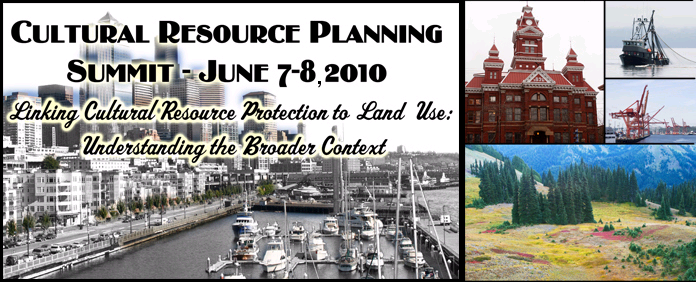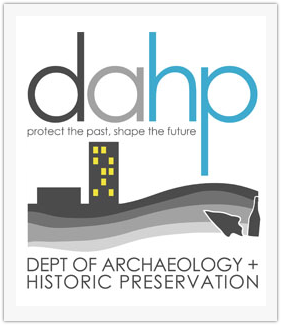CULTURAL RESOURCE PLANNING SUMMIT UPDATE
Apr 28, 2010
 Special workshop and panel session on the State Environmental Policy Act, or SEPA. Special emphasis will be given to cultural resource compliance issues, including Question 13 on the Environmental Checklist. The SEPA Basics workshop will be held on Day 1 and led by the Washington State Department of Ecology, and the panel session will be held on Day 2. Lunch on Day 1 will include the viewing of a special video by the Cultural Resources Protection Program of the Confederated Tribes of the Umatilla Indian Reservation (CTUIR). Remember to book your room at the Suquamish Clearwater Casino Resort by May 15! Call 1-866-609-8700 and ask for the group rate. 2010 Draft Agenda has now been posted to the Website. "Linking Cultural Resource Protection to Land Use: Understanding the Broader Context" Problem solving and decision making are critical elements of most professions, including cultural resource planning. Generating workable solutions requires clearly identifying and defining the problems; this, in turn, rests upon an understanding of the broader context influencing the situation. What broader context influences cultural resource planning as it is practiced today? Cultural resource planning typically occurs in the broader context of “land use” which encompasses all facets of how we use (or don’t use) the natural environment. Land use policies and practices include zoning regulations, commercial and residential development, and preservation of open spaces and critical areas. Why should cultural resource professionals worry about understanding the broader context in which they work? Understanding the intersection between cultural resource protection and land use is an effective means of resolving issues before they escalate into emotionally-charged, divisive, and expensive stalemates or law suits. Join an experienced slate of speakers and presenters as we examine the issues affecting cultural resource protection and identify solutions that will work in the broader context of land use. Leave with proven strategies for saving time, money, and cultural resources! Special Session on Public Ports: Property development is not just the realm of private investors; even government entities such as public ports act as developers. Do you know what public ports do and how you should engage with them to protect sensitive cultural and historical resources? In addition to shipping terminals, ports also typically operate marinas, docks, airports, railroads, industrial sites, and recreational facilities. Join a group of port employees and cultural resource consultants to learn more about these entities, how they do business, and how they fulfill their cultural resource responsibilities. Presentations will focus on ports and their development responsibilities, case studies of port projects that have involved cultural resource issues, and approaches that can be taken to identify potential conflicts with resources before a development project goes too far. Keynote Speaker: Knute Berger Knute "Skip" Berger is author of "Pugetopolis: A Mossback Takes on Growth Addicts, Weather Wimps and the Myth of Seattle Nice" (Sasquatch Books, 2009). He writes the "Mossback" column for Crosscut.com, a Pacific Northwest online daily. He also pens a monthly back page column for Seattle Magazine, where he is Editor-at-Large. He is a regular news commentator on Seattle's public radio station, KUOW-FM. Between 1990 and 2006 Berger did three stints as editor of Seattle Weekly. He was founding editor of Eastside week and executive editor of Washington Magazine. His writing has won numerous awards. In 2008, he won the Washington State Historic Preservation Officer's Annual Media Award for his coverage of historic preservation issues. He lives in Seattle.
Special workshop and panel session on the State Environmental Policy Act, or SEPA. Special emphasis will be given to cultural resource compliance issues, including Question 13 on the Environmental Checklist. The SEPA Basics workshop will be held on Day 1 and led by the Washington State Department of Ecology, and the panel session will be held on Day 2. Lunch on Day 1 will include the viewing of a special video by the Cultural Resources Protection Program of the Confederated Tribes of the Umatilla Indian Reservation (CTUIR). Remember to book your room at the Suquamish Clearwater Casino Resort by May 15! Call 1-866-609-8700 and ask for the group rate. 2010 Draft Agenda has now been posted to the Website. "Linking Cultural Resource Protection to Land Use: Understanding the Broader Context" Problem solving and decision making are critical elements of most professions, including cultural resource planning. Generating workable solutions requires clearly identifying and defining the problems; this, in turn, rests upon an understanding of the broader context influencing the situation. What broader context influences cultural resource planning as it is practiced today? Cultural resource planning typically occurs in the broader context of “land use” which encompasses all facets of how we use (or don’t use) the natural environment. Land use policies and practices include zoning regulations, commercial and residential development, and preservation of open spaces and critical areas. Why should cultural resource professionals worry about understanding the broader context in which they work? Understanding the intersection between cultural resource protection and land use is an effective means of resolving issues before they escalate into emotionally-charged, divisive, and expensive stalemates or law suits. Join an experienced slate of speakers and presenters as we examine the issues affecting cultural resource protection and identify solutions that will work in the broader context of land use. Leave with proven strategies for saving time, money, and cultural resources! Special Session on Public Ports: Property development is not just the realm of private investors; even government entities such as public ports act as developers. Do you know what public ports do and how you should engage with them to protect sensitive cultural and historical resources? In addition to shipping terminals, ports also typically operate marinas, docks, airports, railroads, industrial sites, and recreational facilities. Join a group of port employees and cultural resource consultants to learn more about these entities, how they do business, and how they fulfill their cultural resource responsibilities. Presentations will focus on ports and their development responsibilities, case studies of port projects that have involved cultural resource issues, and approaches that can be taken to identify potential conflicts with resources before a development project goes too far. Keynote Speaker: Knute Berger Knute "Skip" Berger is author of "Pugetopolis: A Mossback Takes on Growth Addicts, Weather Wimps and the Myth of Seattle Nice" (Sasquatch Books, 2009). He writes the "Mossback" column for Crosscut.com, a Pacific Northwest online daily. He also pens a monthly back page column for Seattle Magazine, where he is Editor-at-Large. He is a regular news commentator on Seattle's public radio station, KUOW-FM. Between 1990 and 2006 Berger did three stints as editor of Seattle Weekly. He was founding editor of Eastside week and executive editor of Washington Magazine. His writing has won numerous awards. In 2008, he won the Washington State Historic Preservation Officer's Annual Media Award for his coverage of historic preservation issues. He lives in Seattle.



